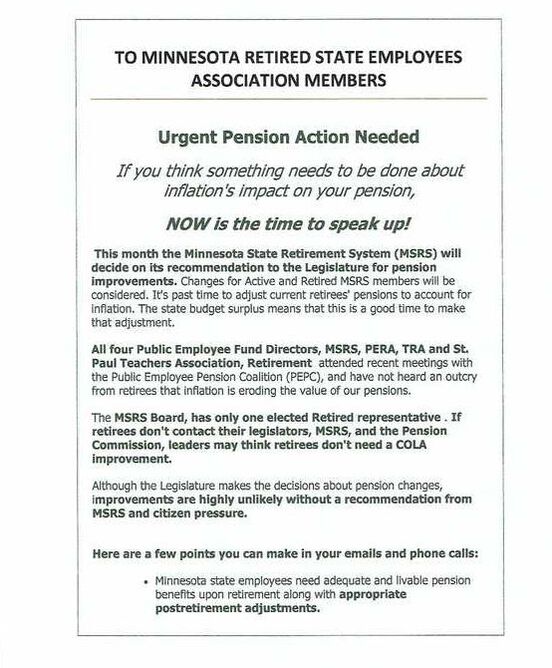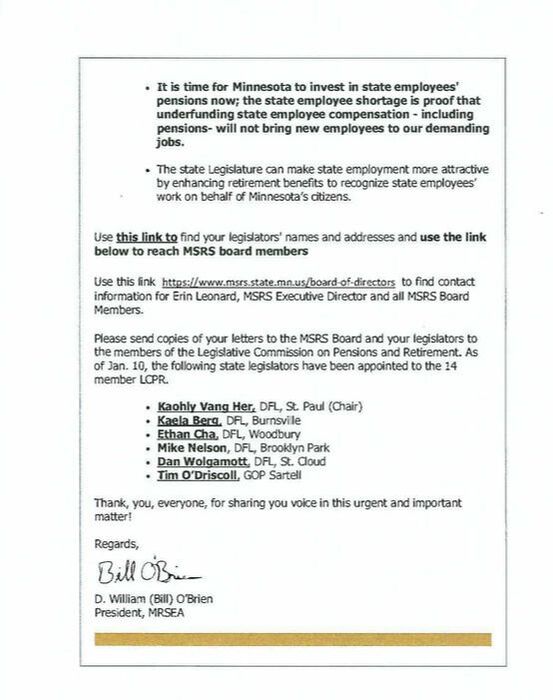|
Several organizations such as AARP, Minnesota AFL-CIO, major political parties, etc. have issued summaries of the past legislative session. We borrowed heavily from these sources and are thankful to each of them. Our effort here is to present the highlights of the items that we believe are of most interest to our members.
PENSIONS
SECURE CHOICE
TAXES
PROPERTY TAX RELIEF
PAID FAMILY AND MEDICAL LEAVE
LIVE WELL AT HOME GRANTS, NEW INVESTMENTS IN HOME AND COMMUNITY-BASED SERVICES AND EXTENDING AGE-FRIENDLY GRANTS
PERSCRIPTION DRUG AFFORDABILITY BOARD
All Retired State Employees: Education Minnesota is holding a Pension Rally this coming Monday, April 3rd. The rally will be held in the Rotunda of the State Capitol from 3:45 – 4:45. Various legislators will be speaking. We believe it is the only rally for retiree pensions. MRSEA members might want to join in because the rally will highlight the need to compensate public employee retirees for losses to INFLATION. Monday is also the last meeting of the LCPR. The Commission will introduce and vote on a "Delete Everything" amendment, which will be the draft legislation that the LCPR will be recommending to the Legislature and the Governor. If accepted, retirees will wind up with a 2.5% one-time COLA payment. Attached below is a spreadsheet that shows the distribution of the total 600 million budget target the legislative leadership gave the LCPR. Below is a link to the LCPR that will allow you to view the amendment and the agenda for Monday’s meeting. Only written testimony will be accepted at this meeting. The link to viewing the meeting is also available on the LCPR home page. Some helpful links: www.lcpr.mn.gov – LCPR website www.house.mn.gov – where to find your state representatives and contact them www.senate.mn – where to find your state senators and contact them www.leg.mn.gov – where to find bills being considered by the legislature www.msrs.state.mn.us – MSRS website www.mrsea.org – MRSEA website. The latest information about the organization MRSEA – representing ALL RETIRED state employees!!
To find your legislatures' names and addresses mentioned above, click here:
https://www.gis.lcc.mn.gov/iMaps/districts/ To contact your MSRS board members, click here: https://www.msrs.state.mn.us/board-of-directors In a non-traditional approach to pensions this session, the Legislature is bypassing the Legislative Commission on Pensions and Retirement (LCPR) with bills making major modification to pension laws. With no meetings scheduled or LCPR proposals addressing general pension issues alive, some Commission members have submitted pension bills to House and Senate committees.
In the House, what started out as a $1 Billion bill by Rep. Mary Murphy is now less than half that. The good part is that Rep. Michael Nelson, chair of the State Government. Finance Committee, included Mary’s bill in the Omnibus State Government Finance Bill (HF 4953). The House passed the bill and a conference committee is working to craft a compromise that the House and Senate can agree on. However, the House and Senate have agreed on very little so far. One pundit said, “They aren’t even on the same planet on spending.” That does not bode well for pensions. We are only halfway to our goal of getting a good pension bill to the Governor’s desk. We saw progress in the House which passed HF 4293 that would provide lump-sum COLA (Cost of Living Adjustment) payments on Jan. 31, 2023 and 2024, equal to 2.5 percent of the previous years’ annual benefit. The bill would send $400 million to public employee pension plans to cover the cost of the lump sum payments and reduce the assumed rate of return (ARR) from 7.5 to 7 percent. Unfortunately, there is an eerie silence in the Senate. Senator Julie Rosen, chair of the LCPR, started out with a strong pension bill over a month ago. But that bill disappeared, LCPR meetings were cancelled, and nothing has been heard from the Senate on public employee pensions. The companion bills to the House bills are stuck in the Senate’s Ways and Means Committee. Rosen’s bill in the Senate would provide for a 1.5 percent permanent COLA and would reduce contributions by active educators by .5% but there is no progress at this time. The bottom line: your pension needs a little help from you! Please call or email your state representative and your state senator. They need to get the following message from YOU: “As a Minnesota retiree, I want you to know that we need help with inflation. I am on a fixed income and inflation is eating into my ability to live my life. . Please support a strong pension bill that raises our Cost of Living Adjustment so we can keep up with inflation. “ Here’s where to find contact information for your state senator and your state representative. https://www.gis.lcc.mn.gov/iMaps/districts/ Gov. Mark Dayton Thursday signed a bill to stabilize pensions for more than 500,000 workers and retirees in Minnesota. State officials call it a historic day, saying it is the largest pension reform legislation in state history. Both the Senate and House passed the bill unanimously.
The three year journey for the pension bill ended at six minutes before the deadline of midnight Sunday. The public pension funding bill passed the Senate 65-0 after it passed the House 131-0. The bill is now headed to Governor Dayton’s desk where he is expected to sign S.F. 2620 into law.
Minnesota takes its fiscal responsibility seriously. The Legislative Commission on Pensions and Retirement (LCPR) unanimously passed a bipartisan Omnibus Pension Bill (SF2620/HF3053) on March 13th and was referred to the House and Senate. The bill has now passed through several Senate committees and on March 26th it passed unanimously on the Senate floor. That Senate bill has now been sent to the House and currently sits in the House Government Operations Committee. This bill is the product of three years of work but it still has a ways to go.
New legislation allows a subtraction for an amount of Social Security benefits, up to a maximum amount effective for Tax year 2017. The maximum subtraction is $4,500 for married couples filing joint returns, $3,500 for single and head of household filers, and $2,250 for married couples filing separate returns. The subtraction is reduced by 20 percent of provisional income over a threshold.
People who have purchased long-term care insurance through SEGIP will see a premium increase in each of the next 3 years. This post answers questions about when, why, and how much the premiums will change.
|
|||||||


